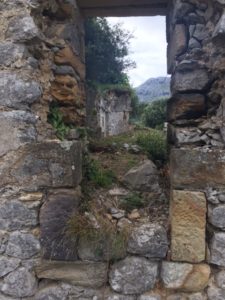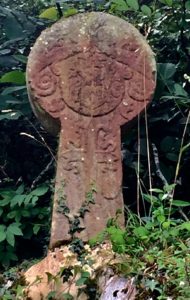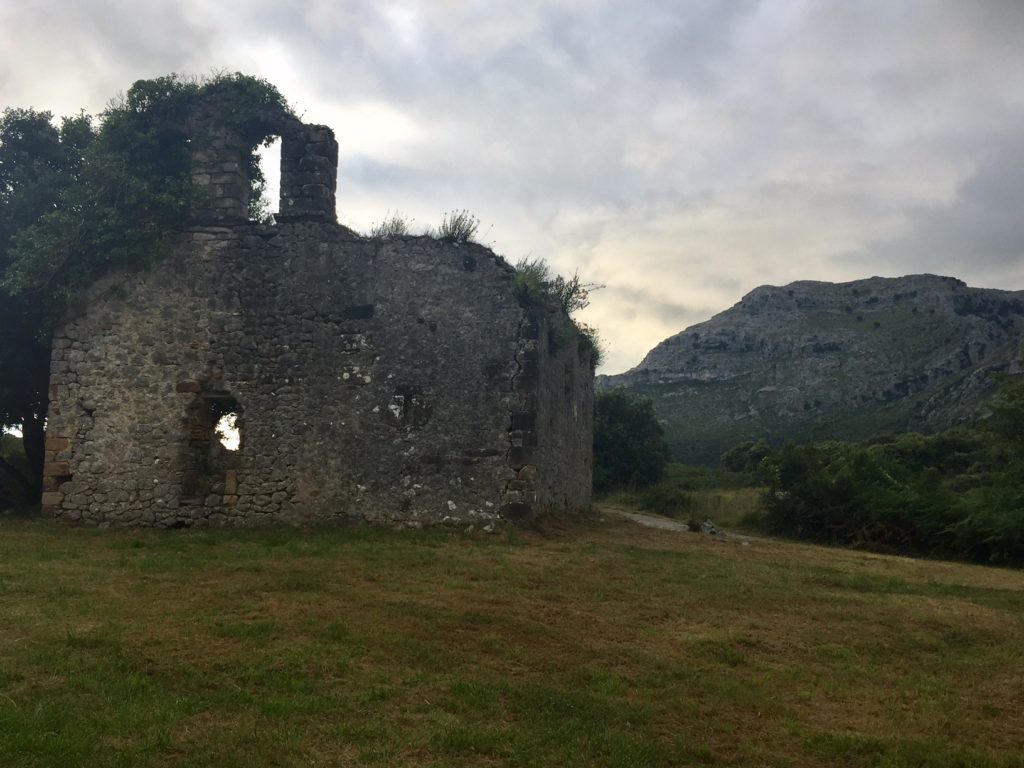superpowers
in every village
here I find
a church
with houses
clustered close
as if this god
would strike
them if
they scattered
I was getting smarter about my mileage. Kilometerage. I’d taken two stages (per my guidebook) and divided the total 60km into three days of 15-25km each, depending – longer days of flatter terrain, shorter days of mountainous terrain. It felt like my guidebook was written by this guy who wanted to check the Camino off his bucket list. His name was something like Alexander; I decided he was an Alex. When I needed more detail, Alex provided none; where Alex gave me details, they were often extraneous, as I looked up and found yellow arrows guiding me.
So I decided, That’s it, Alex – I’m taking my Camino into my own hands. Taking back my Camino power. Power to the Peregrinos! Oh Yes We Caminante! Watch out…troublemaker at the taverna; yeah, the one with the cafe con leche and big awkward notebook. El Gallito: the rowdy Rooster crows.
I was walking stronger these days, better in my boots, slightly faster pace, and as I grew stronger, I felt younger. And as I felt younger, sometimes things got interesting.
As I sat drinking my coffee, I couldn’t help overhearing the loud, young American at the next table pontificating to his new European friends. First, he defended recent spectacularly failed military decisions by our most inexperienced and incompetent president; I felt my jaw tense in embarrassment, like I was silently taking it on the chin, but sipped and tried to continue writing. But once he said, “Americans – we love our guns. We have great gun policies” – inside, I lost it. That’s it, Alex.
“Speak for yourself, friend,” I called over, the disgust obvious in my voice.
“What was that?” he asked, startled at having his monologue interrupted by a heckler.
“Speak – for – yourself,” I repeated. “Speak for yourself, not for America. Don’t speak for me. Some of us think our gun policies are terrible.”
“Are you American?” he asked, bewildered.
“Yes, and for much longer than you,” I replied condescendingly, holding back the “sonny” I so wanted to add to the end of that statement.
The Europeans were clearly entertained, as the young American tried to save face. “I was just speaking in generalities,” he backpeddled. But I wasn’t having it.
“You can’t do that. You have to speak for yourself. Just give your own thoughts standing on your own two feet – which is harder,” I added pointedly. “Don’t speak for me. I can do that just fine.”
We agreed to disagree, meaning he said he would stop talking about guns, then left for the bathroom. Seventeen-year-old me sat back, satisfied, and finished her coffee. Sonny, she mused into her cup.
Age had tamed my fury but not my tongue. Still, I was reassured no one had assumed I was American until I made that fact clear. I was trying to just be myself, not represent a superpower. The “Ugly American” reputation abroad was not unfounded, and I had been trying to steer clear.
All along the Camino, it kept happening: I was most often mistaken for British, or Danish, which actually made sense. Only third-generation American, I grew up among Nordic elders new to the country, and the language. My Midwestern accent had never faded, even after I moved west, and so I spoke English with the inflection of that farm country filled with Scandinavians, but slowed to the pace of Colorado ski bums. I sounded like a Dane who spoke English as a second language…or a tired Iowa church lady after a long morning serving coffeecake in the church basement to my sewing circle. As a child, I assumed all old people spoke with Norse accents – simply as a function of age, as if I would also adopt this speech pattern one day. Maybe I had.
I’d been studying the Primitivo route in the guidebook again. While the Norte took me along the seaside cliffs and down onto the warm sandy beaches, the Primitivo crossed the heart of the rugged Asturias region, mountains said to make my day out of Irun look like child’s play. Soon I would come to this fork in the road, Norte versus Primitivo. I remembered my cab driver’s warning: montañas. I had disregarded it to my blistered feet’s regret. Yet I carried an irrational belief that my Rocky Mountain hiking would somehow see me through the high-altitude Primitivo, all appearances on the Norte to the contrary. Besides, I had a walking stick now.
 I felt a longing to see this oldest stretch of the Camino, some of it said to be from the 700-800’s, traversing Roman roads and bridges. I struggled to conceptualize this ancient history under my feet, and wanted to walk it myself, place my feet into the dusty footsteps of so many thousands of pilgrims before me, century upon century. I wanted to join them.
I felt a longing to see this oldest stretch of the Camino, some of it said to be from the 700-800’s, traversing Roman roads and bridges. I struggled to conceptualize this ancient history under my feet, and wanted to walk it myself, place my feet into the dusty footsteps of so many thousands of pilgrims before me, century upon century. I wanted to join them.
During the eighth and ninth centuries, my own people would have been in full-on Viking mode, invading Britain, creating the Danelaw, eyeing France and the riches of the Mediterranean. Not particularly penitent. No church could yet hold their allegiance. They answered to wild gods who bestowed honor upon those who died in battle.
I felt relatively young, my life next to all this history, as I considered my blisters and cracked stick against the Primitivo – and a bit foolhardy. As young people often are. As my recent ancestors had been, to leave home and family for America. Risk takers. Adventurers. Audacious.
You probably shouldn’t speak for them, though; you don’t actually know what they went through, seventeen-year-old me mocked.
Embarrassed to be American, I was embracing being a Viking. The people who, generations later, eventually settled in the American Midwest. Not sure what kind of sense that looping incongruity made. I kept cloaking my life in assumed identities: Scandinavian, Midwesterner, gifted student, angry rebel, social worker, older-but-wiser, single mother, coffee-drinking writer. I’d been pulling this chameleon act since I left home 34 years earlier. I felt more powerful in those roles, strutting and fretting my hour upon the stage, raising my voice against the tempest as I bemoaned those who suffer. Disguising my affinity in a costume of tough affection.
Speaking for myself: I was born to a fierce inheritance. Me, personally.
What does not kill us, makes us stronger. Or makes us into a nonstop warrior, always defensive, always looking over the shoulder of our joy for the faintest rustle of the next attack. There could be no lasting peace, as long as I had unfinished business with my youth – my very personal history. The role of a lifetime.
Primitivo it is, I nodded to my younger self, as she easily shouldered the pack. Smart aleck, I added.
She blew me a sarcastic kiss.

